|
|
|
Sort Order |
|
|
|
Items / Page
|
|
|
|
|
|
|
| Srl | Item |
| 1 |
ID:
108414


|
|
|
|
|
| Publication |
2011.
|
| Summary/Abstract |
NATO has been a source of influence on British nuclear policy and strategy since the 1950s. The nature and extent of its influence has, however, been kept limited by successive British governments. This article considers how and why this has happened. It discusses evolving British attitudes towards NATO command and planning, and shows how these were reflected with regard to strategic nuclear issues from the late 1950s. The evolution of the key notion that the United Kingdom is a second centre of nuclear decision within NATO is traced, and both its utility and contradictions are examined. Overall it is argued that, both during and since the Cold War, NATO has neither been a central factor in shaping British nuclear strategy and policy, nor have British nuclear weapons been other than of limited importance and relevance for most NATO members.
|
|
|
|
|
|
|
|
|
|
|
|
|
|
|
|
| 2 |
ID:
051750
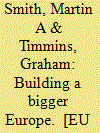

|
|
|
|
|
| Publication |
Aldershot, Ashgate, 2000.
|
| Description |
xiii, 184p.
|
| Standard Number |
1840144610
|
|
|
|
|
|
|
|
|
|
|
|
Copies: C:1/I:0,R:0,Q:0
Circulation
| Accession# | Call# | Current Location | Status | Policy | Location |
| 042867 | 355.031/SMI 042867 | Main | On Shelf | General | |
|
|
|
|
| 3 |
ID:
056022
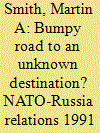

|
|
|
| 4 |
ID:
168888


|
|
|
|
|
| Summary/Abstract |
The United States was at least partly culpable for the failure of denuclearisation agreements with North Korea concluded during the presidencies of Bill Clinton and George W. Bush in the 1990s and early 2000s. American failure to implement commitments in a timely manner arose from a combination of domestic and presidential politics, the constraints imposed by international partnerships, and bureaucratic structures and procedures. For its part, North Korea implemented its commitments faithfully until its leadership’s increasing disenchantment with American tardiness and perceived lack of good faith.
|
|
|
|
|
|
|
|
|
|
|
|
|
|
|
|
| 5 |
ID:
006650


|
|
|
|
|
| Publication |
Bradford, Deptt. of Peace Studies, 1996.
|
| Description |
87p.
|
| Series |
Peace Research Report; 37
|
| Standard Number |
1851431519
|
|
|
|
|
|
|
|
|
|
|
|
Copies: C:1/I:0,R:0,Q:0
Circulation
| Accession# | Call# | Current Location | Status | Policy | Location |
| 038341 | 341.242/SMI 038341 | Main | On Shelf | General | |
|
|
|
|
| 6 |
ID:
133282
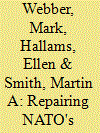

|
|
|
|
|
| Publication |
2014.
|
| Summary/Abstract |
NATO moves toward its next summit (to be held in Newport, Wales in September 2014) in a mood of anxiety and uncertainty. This is not simply because telling questions are being asked of the alliance in relation to Afghanistan and Ukraine, but because the twin motors which have sustained NATO now show signs of considerable wear and tear. The first of these motors relates to principles of purpose. This encompasses the activities (or purposes) which NATO has consciously pursued in the last 25 years: namely, operations, enlargement, partnership, transatlanticism and security. The second is principles of function: the means, in other words, by which NATO is kept in motion. Here, American leadership, cohesion and trust, burden-sharing and credibility all matter. These motors are not about to completely break down (NATO has underlying strengths which make that unlikely) but they do need attention. NATO's good health requires it to focus on a series of core tasks-what this article refers to as readiness, reassurance and renewal. These three tasks speak to an agenda of consolidation and preservation, rather than one of task expansion. But this is not a conservative agenda; grasping the nettle of prioritization and focus requires, in itself, a certain foresight and enterprise. Managed successfully, it is an agenda that will preserve and strengthen NATO in what are increasingly troubled times.
|
|
|
|
|
|
|
|
|
|
|
|
|
|
|
|
| 7 |
ID:
170466
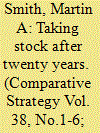

|
|
|
|
|
| Summary/Abstract |
Overall, there is mixed evidence of the enduring impact of the Kosovo crisis and Operation Allied Force (OAF) twenty years after the events. OAF and the follow-on deployment of the Kosovo Force (KFOR) in 1999 did consolidate and in effect make permanent a NATO and wider Western presence and set of interests in the Balkan region. NATO’s use of force against Serbia also caused the most serious rupture to date in its already-fragile institutional and diplomatic relationship with Russia, which revealed its fundamental weaknesses and limitations and from which it would never fully recover. On the other hand, and despite the widely perceived existential importance of its prevailing over Kosovo for NATO’s institutional credibility and effectiveness at the time, the longer-term impact of OAF and the KFOR deployment has proved transient and limited in terms of the institution’s ongoing post–Cold War evolution. This is evident not least in the failure to sustain and develop any distinct humanitarian dimension to NATO over the past two decades.
|
|
|
|
|
|
|
|
|
|
|
|
|
|
|
|
| 8 |
ID:
061079


|
|
|
| 9 |
ID:
071753
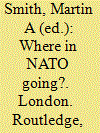

|
|
|
|
|
| Publication |
London, Routledge, 2006.
|
| Description |
vii, 180p.
|
| Standard Number |
0415384141
|
|
|
|
|
|
|
|
|
|
|
|
Copies: C:1/I:0,R:0,Q:0
Circulation
| Accession# | Call# | Current Location | Status | Policy | Location |
| 051240 | 355.031091821/SMI 051240 | Main | On Shelf | General | |
|
|
|
|
|
|
|
|
|